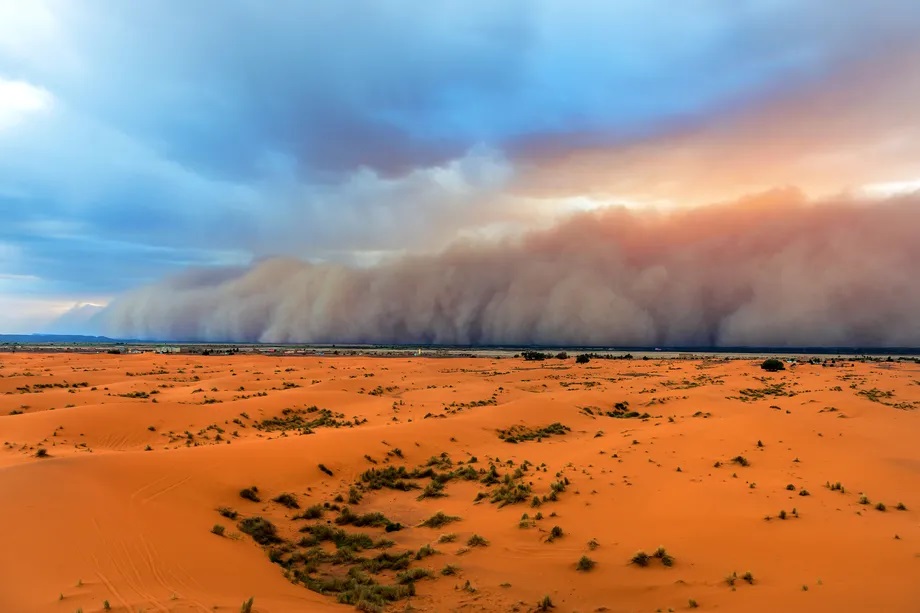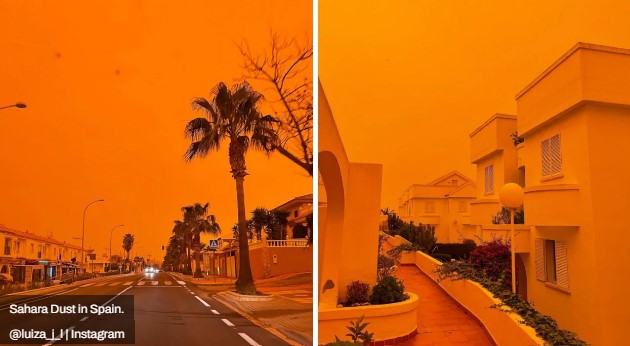The Sahara, Earth’s largest and hottest desert, isn’t just a vast expanse of dunes. It’s a dynamic landscape, shaping weather patterns and playing a surprising role in global dust storms, impacting regions far beyond its borders. Let’s delve into the fascinating interplay between the Sahara and these mesmerizing, yet potentially destructive, atmospheric phenomena.
Sahara Desert Dust Storms: A Wellspring of Dust
 Image source: Pavliha/Getty Images
Image source: Pavliha/Getty Images
How do Saharan dust storms form? The Sahara’s aridity, coupled with strong winds, creates a perfect recipe for dust storm formation. Here’s why:
Limited Vegetation
Sparse vegetation cover leaves the loose, dry soil exposed and vulnerable to wind erosion.
High Wind Speeds
Powerful winds, fueled by pressure differences and atmospheric circulation patterns, pick up the loose soil particles, whipping them into storms of dust.
Local Factors
Topography, like dry lake beds, further contributes to dust movement.
The Global Impact of Dust Storms
So how does the Saharan dust affect the global climate? While dust events regularly happen in the Sahara, which stretches across 10 countries, some factors propel them beyond the desert’s borders:
Jet Streams
High-altitude winds can loft dust particles further and transport across vast distances, affecting distant regions.
Storm Systems
Intense weather systems can interact with dust plumes, changing their trajectory and influencing their impact.
Trade Winds
These prevailing winds carry tons of dust westward across the Atlantic Ocean, reaching the Caribbean, the Americas, and even parts of Europe. As a result, a dusty haze called the Saharan Air Layer (SAL) is formed. It impacts marine ecosystems, air quality, and even the Atlantic hurricane formation.
When the dust plumes from the Sahara reach Europe, they cause skies to turn a hazy orange or even red. This dramatic effect captures public attention and highlights the far-reaching impact of Saharan dust storms.

Sahara dust has far-reaching consequences, affecting various aspects of the environment and human health:
- Climate. Dust particles can reflect sunlight back into space, potentially having a cooling effect on Earth’s surface temperature. However, they can also absorb and trap heat radiation, contributing to warming in some regions.
- Ocean ecosystems. Dust events can fertilize ocean waters by depositing nutrients like iron and phosphorus, potentially affecting marine productivity.
- Human health. Atmospheric dust can irritate respiratory systems, exacerbate allergies and asthma, and pose a health risk, especially for vulnerable populations. Some studies have found that air pollution resulting from dust storms increases child mortality and even worsens dementia symptoms.
Global Dust Storms: A Delicate Balance
The influence of the Sahara on global dust storms is complex and interconnected with various factors:
Climate Change
Rising temperatures and changing precipitation patterns can potentially increase the frequency and intensity of droughts in the Sahara, leading to more dust mobilization.
Land-Use Practices
Overgrazing and deforestation can contribute to soil degradation, increasing the susceptibility of land to wind erosion.
Sustainable Management
Implementing practices like sustainable land management and dust storm mitigation strategies are crucial to reducing dust emissions and their associated environmental and health impacts.
Scientists track dust sources, wind patterns, and atmospheric shifts—just like how Rain Viewer’s weather radar maps visualize weather changes in real-time. Understanding these patterns helps improve storm forecasting and air quality predictions.
Conclusion
The Sahara Desert is not simply a vast wasteland; it’s a dynamic force shaping global weather patterns and influencing storms of dust that span continents. Understanding this crucial role is essential for mitigating the negative dust storm impact, ensuring a healthier planet and a more sustainable future for all.






